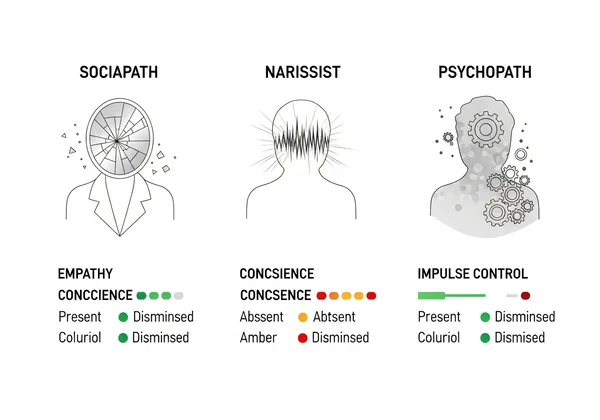The Sociopath Test: Differentiating Sociopaths, Narcissists, and Psychopaths in the Dark Triad
November 20, 2025 | By Roman Caldwell
Struggling to differentiate between a sociopath, a narcissist, and a psychopath is common. People often use these terms interchangeably, creating confusion when trying to understand complex behaviors—in others or yourself. This confusion is often what leads people to search for a sociopath test online to gain some initial clarity. This guide untangles the "Dark Triad," clarifying the distinct characteristics, overlaps, and crucial differences between these personality structures. By the end, you'll have a clearer framework for understanding them.
Understanding these traits can be a crucial first step toward greater self-awareness or navigating difficult relationships. For a confidential way to explore some of these characteristics, consider a preliminary self-assessment.
Understanding the Core Dark Triad Traits
The "Dark Triad" is a psychological term for three related personality traits: narcissism, Machiavellianism, and psychopathy. While our focus is on sociopathy, narcissism, and psychopathy, they share a core of manipulative, antagonistic behaviors. All involve callousness and a tendency to prioritize personal gain over others' well-being.

Defining Antisocial Personality Disorder (Sociopathy)
Often, what people refer to as sociopathy is clinically understood as Antisocial Personality Disorder (ASPD), as outlined in the Diagnostic and Statistical Manual of Mental Disorders (DSM-5). The hallmark of ASPD is a pervasive disregard for and violation of the rights of others.
Key characteristics include a failure to conform to social norms, deceitfulness, impulsivity, irritability and aggressiveness, and a consistent irresponsibility in work or financial matters. A crucial element is a lack of remorse; they may feel indifferent or rationalize having hurt, mistreated, or stolen from another person. Sociopathy is often believed to be shaped more by environmental factors—like a traumatic or chaotic childhood—than by genetics alone.
The Landscape of Narcissistic Personality Disorder (NPD)
Narcissism exists on a spectrum, but Narcissistic Personality Disorder (NPD) is a clinical diagnosis. The core of NPD is a pervasive pattern of grandiosity, a constant need for admiration, and a profound lack of empathy. Individuals with NPD often have an inflated sense of self-importance, are preoccupied with fantasies of unlimited success or power, and believe they are "special" and unique.
While they can be charming and charismatic, this facade often hides a fragile self-esteem. They are highly sensitive to criticism and may react with rage or contempt when challenged. Their inability to recognize or identify with the feelings and needs of others is what makes relationships with them so challenging.
The Characteristics of a Psychopath
Psychopathy is not an official DSM-5 diagnosis in the same way ASPD and NPD are, but it is a widely studied construct in psychology. It is often considered a more severe form of ASPD, characterized by a complete lack of empathy and conscience. Psychopaths are often seen as more cold, calculating, and controlled than sociopaths.
Their behavior is less likely to be driven by reactive rage and more by cold, predatory intent. They can be charming, intelligent, and adept at mimicking emotions to manipulate those around them, making them particularly difficult to identify. Many researchers believe psychopathy has stronger genetic or biological roots, potentially linked to underdeveloped brain regions responsible for emotion and impulse control.
Key Distinctions: Sociopath vs. Narcissist vs. Psychopath
While they share a lack of empathy and a willingness to exploit others, the motivation, emotional experience, and behavior of individuals with these traits differ significantly. Understanding these nuances is key to differentiating them. For those questioning these traits in themselves, a free online test can offer a starting point for reflection.

Empathy, Conscience, and Impulse Control: The Defining Gaps
This is where the clearest lines can be drawn.
- Narcissists have a diminished capacity for empathy, but it's not entirely absent. Their self-absorption simply overrides it. They are too focused on their own needs and validation to genuinely consider others' feelings.
- Sociopaths have a very weak conscience and a limited ability to feel genuine empathy. They might intellectually understand that their actions are wrong by societal standards but feel little to no guilt. Their behavior is often erratic and impulsive.
- Psychopaths are defined by a total absence of empathy and conscience. They feel no remorse. Any "emotional" display is a calculated performance to achieve a goal. They possess a chilling level of impulse control, allowing them to plan manipulative acts far in advance.
Behavioral Patterns in Relationships and Society
How these traits manifest in daily life also reveals their differences.
- Narcissists need an audience. Their goal in relationships is to secure "narcissistic supply"—admiration, praise, and attention. They will discard people once they are no longer useful sources of validation.
- Sociopaths are often more volatile and visibly antisocial. They struggle to maintain long-term jobs or relationships due to their impulsivity and unreliability. Their trail of broken rules and burned bridges is often easy to spot.
- Psychopaths are chameleons. They can maintain a convincing facade of normalcy for years. They might be successful professionals or seemingly devoted family members, all while engaging in calculated deception and manipulation behind the scenes. Their parasitic lifestyle is often well-hidden.
Origins: Nature, Nurture, and Development
The developmental pathways for these traits are thought to be different, highlighting the classic "nature vs. nurture" debate.
-
Narcissism is often linked to childhood experiences, such as excessive pampering or, conversely, extreme criticism, leading to a fragile ego that needs constant external validation.
-
Sociopathy (ASPD) is strongly associated with environmental factors. A history of childhood abuse, neglect, and instability can contribute significantly to its development.
-
Psychopathy is believed to have a stronger biological or genetic component. Brain imaging studies have suggested differences in the prefrontal cortex and amygdala, areas that govern decision-making and emotional responses.

The Nuance of Diagnosis: Why Professional Insight is Essential
It's tempting to use these labels for people we find difficult, but it's critically important to remember that these are serious clinical concepts. Self-diagnosis or diagnosing others is not only unreliable but can also be harmful. True personality disorders are pervasive, long-term patterns of behavior that cause significant distress or impairment.
Navigating the DSM-5: Official Criteria and Categories
Psychologists and psychiatrists use the DSM-5 as a standardized guide for diagnosis. A diagnosis of ASPD or NPD requires a comprehensive evaluation by a qualified mental health professional. They assess long-term patterns of behavior against a specific set of criteria. There is no simple blood test or scan; it's a careful, evidence-based process. This complexity is why an online sociopath test should only be used for insight, not diagnosis.
From Self-Reflection to Seeking Professional Assessment
If you recognize some of these traits in yourself or someone you care about, the first step is understanding, not labeling. A confidential online tool can be a safe place to begin that journey of reflection. It can help organize your thoughts and provide a baseline understanding before you decide on the next steps. If what you learn is concerning, the most responsible action is to seek guidance from a licensed therapist or counselor. They can provide a proper assessment and support. Why not gain some insight today?

Beyond Labels: Seeking Understanding and Support
Differentiating between a sociopath, a narcissist, and a psychopath is more than an academic exercise; it's about understanding the deep-seated motivations and emotional capacities that drive human behavior. While the "Dark Triad" traits all involve manipulation and a lack of empathy, their expressions and origins are distinct. Narcissists crave admiration, sociopaths act on impulse with little remorse, and psychopaths are cold, calculating predators hiding in plain sight.
Remember, these labels are clinical constructs, not weapons. Their value lies in providing a framework for understanding and, when necessary, seeking appropriate help. If this exploration has raised questions for you, a great next step is to use a structured tool for self-reflection.
Take the first step toward clarity. Visit SociopathTest.org to use our free, confidential, and scientifically-informed tool designed to provide preliminary insights.
Frequently Asked Questions About Dark Triad Traits
What is the main difference between a sociopath and a psychopath?
The primary difference lies in the presence of a conscience and the level of calculation. A sociopath may have a very weak conscience and act impulsively and erratically. A psychopath is believed to have no conscience at all and is far more cold, controlled, and calculating in their actions.
Can an individual exhibit traits of both narcissism and sociopathy?
Yes, this is known as comorbidity. It is quite common for individuals with one personality disorder to exhibit traits of another. For instance, someone with ASPD (sociopathy) might also display the grandiosity and need for admiration characteristic of NPD, a combination often referred to as a "malignant narcissist."
Is there an official psychological test for these personality types?
There is no single "test" like a blood test. Diagnosis is made by mental health professionals through extensive clinical interviews and evaluation based on DSM-5 criteria. Tools like the Psychopathy Checklist-Revised (PCL-R) are used in clinical and forensic settings, but they are administered by trained professionals. A sociopath test found online, like our free tool, is designed for preliminary self-reflection, not for diagnosis.
How do these personality traits affect personal relationships?
All three traits make healthy, reciprocal relationships extremely difficult. Narcissists see partners as sources of admiration, sociopaths see them as objects to be used, and psychopaths view them as pawns in their game. These relationships are often characterized by manipulation, exploitation, and emotional abuse.
Are 'high-functioning' individuals with these traits more common than thought?
Yes, many individuals with these traits are "high-functioning." This is particularly true for those with narcissistic or psychopathic traits, who may use their charm and intelligence to achieve great success in business, politics, or other fields while hiding their destructive tendencies. They are skilled at maintaining a facade of normalcy.